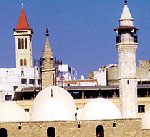Religious Fundamentalism
A Christian-Muslim Symposium
The Arab Working Group for Muslim-Christian Dialogue (AWG) convened a symposium on "Religious Fundamentalism" in Hotel Le Meridien/Commodore, Beirut, between 12 and 14 June 2003. Arab and foreign academics and researchers attended.
Rev. Dr. Riad Jarjour-General Secretary of the Middle East Council of Churches, and also General Secretary of the AWG-was first to speak at the opening session. He was followed by Dr. Muhammad Salim al-'Awwa, charter member of the AWG, and then the patron of the event, the Lebanese Minister of Information, Mr. Michel Samaha.
The working sessions followed. Papers were presented on "Fundamentalism: Probing How the Term Was Coined and Developed," on "Fundamentalism: A Return to Fundamentals for Renewal or to Control the Present," on "Christian Fundamentalism: A Western-American Perspective," on "Islamic Fundamentalism: Approaches to its Substance and Practice," and on "International Conflict and the Clash of Fundamentalisms." The symposium concluded with an address by the AWG's president, Judge 'Abbas Halabi.
In the wrap-up session, the AWG's secretary, Mr. Muhammad Sammak, read the AWG's closing statement, as follows:
One of the founding principles of the Arab Working Group for Muslim-Christian Dialogue is reliance upon dialogue as the foundation from which to dispel confusion concerning what is authentic religious conviction and what is arrogant extremism. In dialogue difference and the "other" who is different are acknowledged. It utterly rejects in all its forms the logic that claims a monopoly on truth and the right to eliminate the "other". Therefore, in organizing this symposium on religious fundamentalism the Arab Working Group intended to open the door to a wide-ranging discussion among this eminent group of the Arab world's intellectuals, Muslims and Christians. The objective was to bring to light intellectual and methodological principles that will help gain insight from scripture into how to address our changing times and its realities.
The Arab Working Group for Muslim-Christian Dialogue, in its Covenant , took pains to disavow the arrogant extremism that leads to violence and fanaticism. It defined extremism as a fanatic mindset that is purely self-absorbed; it defined violence as deviant ethical behavior that intends to impose its ideas by force on those who do not share them. Neither extremism nor violence has any integral link with what it means to be religious, nor are they typical of it. They are conditions bred by a variety of political, social, economic and broad cultural factors and circumstances.
In its Covenant, the group also stressed that an erroneous reading of what it means to be religious only makes a response to those aggravating circumstances more difficult. It loses all sense of balance and adopts behavior patterns unacceptable to authentic religious commitment and to true religious values. In light of this, as it seeks to strengthen the sharing of life together, the objective of dialogue is to promote spirited discussion of those things that make for that which is better. It brings to the fore sublime spiritual and humanitarian values, and directs itself toward lofty goals for achieving the public good, responding to social and developmental problems that face all parts of society. It affirms that a true reading of what it means to be religious includes accepting the "other" who differs religiously, living with that person, and respecting to his or her religious convictions, traditions and disciplines.
Airing the topic of fundamentalism, not least of all as it is expressed in the United States, afforded opportunity for a critical comparison of schools of thought that distort the reading of religious texts, lumbering them with meanings they cannot sustain, and, in effect, revising their literal and formal content so as to serve the demands of specific political inclinations that use them to promote the interests and agenda of this or that group. This comparative exercise in this symposium afforded opportunity to shed light on a vital issue: Extremism, in its aggressiveness against the party that differs and in its effort to destroy the "other", constitutes a serious disease. The most serious threat it poses is when it successfully captures the decision-making process in the most powerful nation on earth.
This was the seventh major symposium organized by the Arab Working Group for Muslim-Christian Dialogue. Earlier topics have included "Muslims and Christians United for the Sake of Jerusalem" ; "The Abrahamic Heritage" ; "Citizenship, Democracy and Human Rights"; "Uniting Against the American Legislation on Religious Persecution"; "Sharing Life Together and Religious Traditions"; and "Muslims and Christians United in Facing Contemporary Challenges".
Before us lie many other working sessions. We ask God to equip us with wisdom and enable us to execute our tasks, working together with you for the welfare of the whole Arab world and our culture of which we are proud and to which all of us, both Muslims and Christians, have contributed.
First appeared in MECC NewsReport , Autumn 2003.
|
